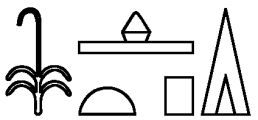According to Wikipedia, the title "Pharaoh" is a New Kingdom one:
Pharaoh is the common title of the monarchs of ancient Egypt from the First Dynasty (c. 3150 BCE) until the Macedonian conquest in 305 BCE, although the actual term "Pharaoh" was not used contemporaneously for a ruler until circa 1200 BCE.
Pharaoh. (2017, March 15). In Wikipedia, The Free Encyclopedia. Retrieved 13:25, March 16, 2017, from https://en.wikipedia.org/w/index.php?title=Pharaoh&oldid=770486002
What title did the Egyptians use for their rulers before the title "Pharaoh" came into use?
 ) is first used in the
) is first used in the  , often abbreviated to
, often abbreviated to  ). This is most commonly encountered on offering stella, where the standard
). This is most commonly encountered on offering stella, where the standard 
 ) which literally means "lord of the sedge and the bee" and which we usually translate as "King of Upper and Lower Egypt" (i.e. the Nile Valley and the Nile delta).
) which literally means "lord of the sedge and the bee" and which we usually translate as "King of Upper and Lower Egypt" (i.e. the Nile Valley and the Nile delta). ) which we translate as "Lord of the two-lands", again referring to upper and lower Egypt.
) which we translate as "Lord of the two-lands", again referring to upper and lower Egypt.